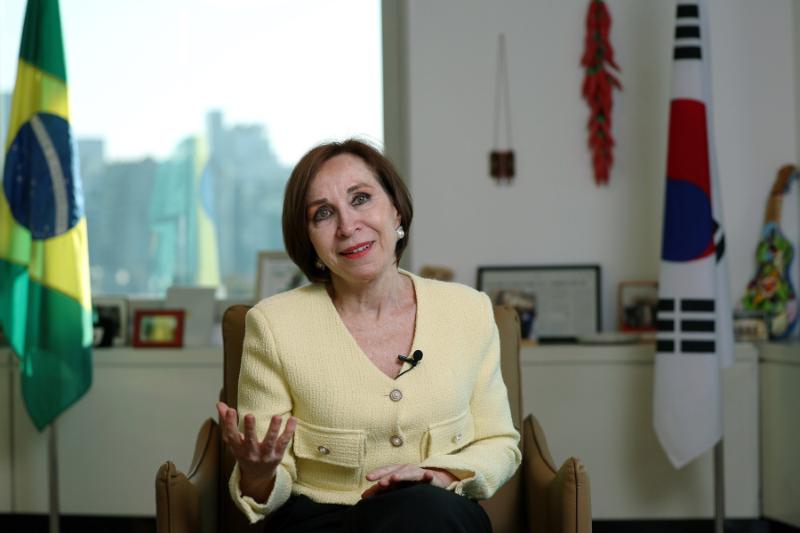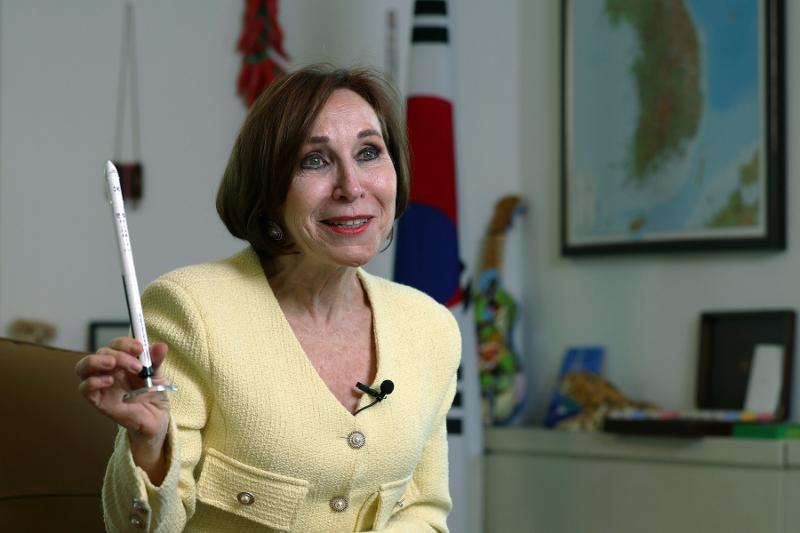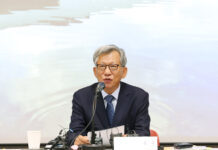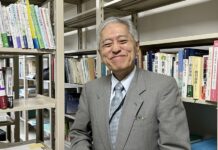
Brazilian Ambassador to Korea Marcia Donner Abreu on Nov 7 talks about the upcoming Group of 20 Summit in Rio de Janeiro and Korea’s cooperation with the G20 in an interview with Korea.net at her embassy in Seoul’s Jongno-gu District.
By Yoon SojungPhotos = Lee Jun Young
Video = Lee Jun Young and Park Daejin
“Renewable and clean energies”
This is what Brazilian Ambassador to Korea Marcia Donner Abreu said when asked about promising areas of cooperation between Korea and Brazil.
“Based on my experience of working here for two years, I think the most interesting area is certainly renewable and clean energies that lower your carbon footprints, where Brazil has considerable potential and Korea as well,” she said.
Renewable and clean energies are related to one of the three priorities of this year’s Group of 20 (G20) Summit slated from Nov. 18-19 in Rio de Janeiro: energy transition and sustainable development.
“From the upcoming summit, we want a stronger commitment to fight climate change and very much hope that countries join us in the G20 with our mobilization to fight climate change,” she said. “We hope President Yoon will also have the opportunity to talk a bit about his or Korea’s cooperation in these priorities.”
The following are excerpts from a Nov. 7 interview with the ambassador at her embassy in Seoul, with additional comment the next day.
President Yoon will attend the G20 Summit in Brazil. What is the event’s agenda?
In this year’s G20 Summit, we have three very special priorities. Our motto is building a just world and a sustainable planet. Toward this aim, we have three big priorities: combating inequality, hunger and poverty; promoting sustainable development and working together; and a call for action to reform global governance or governance of global institutions.
At this summit, Brazil as the chair country launched the Global Alliance to Fight Hunger and Poverty. We very much hope Korea will join this initiative. Our second goal is a stronger commitment to fight climate change. We very much hope that countries join us in the G20 with our mobilization to fight climate change.
Brazil will also host the 30th Conference of Parties (COP30) next year in the Amazon. We hope President Yoon will also have the opportunity to talk a bit about his or Korea’s cooperation in these priorities.
This year marks the 65th anniversary of bilateral ties. What do you consider the most important outcome of such relations?
I would say trade and investment are certainly meaningful. Korea is Brazil’s fourth-biggest trading partner in Asia. We have a lot of big Korean brand names investing in Brazil such as Samsung, Hyundai Motor and CJ. Brazil has a population of more than 200 million, with a huge consumer market and good industrial base as well. More and more Brazilians like Korean culture. We also have a huge ethnic Korean community of over 50,000 in Brazil, and this community is very significant for bilateral ties.
In what areas does Brazil wish to bolster cooperation with Korea?
I think the most interesting area is renewable and clean energies that lower carbon footprints, something Brazil has considerable potential in. Based on my working experience here for two years, I consider Korea to have the same potential thanks to its numerous technologies in sustainable mobility like the use of less carbon-intensive forms of transportation.
Brazil has good experience with ethanol or mixes of it based on sugar cane and gasoline. Korea has hydrogen-powered cars but the industry here shows that hydrogen is probably more suitable for big forms of transportation like trucks and buses.
Both countries are working together in that area because Hyundai Motor in Brazil makes the HB20, a car that runs on ethanol. This was developed for and only exists in Brazil. It’s a bestseller in Brazil and I have one back home. I imagine that hybrid cars will be the next generation of cars that Hyundai produces in Brazil, particularly plug-ins, which offers flexibility for a huge country like Brazil.
Another key area of cooperation is certainly space and aerospace. Brazil has the world’s third-biggest civil aircraft company (Embraer), which won a competition against America in this sector. Last year, the Korean startup Innospace launched a rocket named Hanbit from a Brazilian launch pad, so this is also an area of good cooperation.
Brazilian Ambassador to Korea Marcia Donner Abreu on Nov. 7 discusses bilateral cooperation in space while holding a replica of a rocket developed by Korean startup Hanbit; the projectile was launched from Brazil last year.
Brazil has shown strong interest in Korean culture, with six regions such as the state of Sao Paulo observing Korean Culture Day and the iconic statue Christ the Redeemer early this year clad in Hanbok. How will your government raise cultural understanding by the people of both countries?
We’re interested in a number of cooperation projects with Korea in cultural content. Most recently on Nov. 6, Brazilian Minister of Culture Margareth Menezes and Korean Vice Minister of Culture, Sports and Tourism Yong Hoseong signed a memorandum of understanding on cultural cooperation at Salvador Convention Center in Salvador, Brazil. In tourism, officials in the sector will meet soon at the upcoming United Nations Tourism General Assembly to discuss cooperation.
Brazil has 11 Korea.net Honorary Reporters. Any message for our global readers?
I hope that all of your readers see interesting things about my country and that Honorary Reporters write about interesting elements of the links between our two countries and cultures. I also hope that they take advantage of the visit (to Brazil) of your president to ask him positive questions about relations between our two societies.
arete@korea.kr























